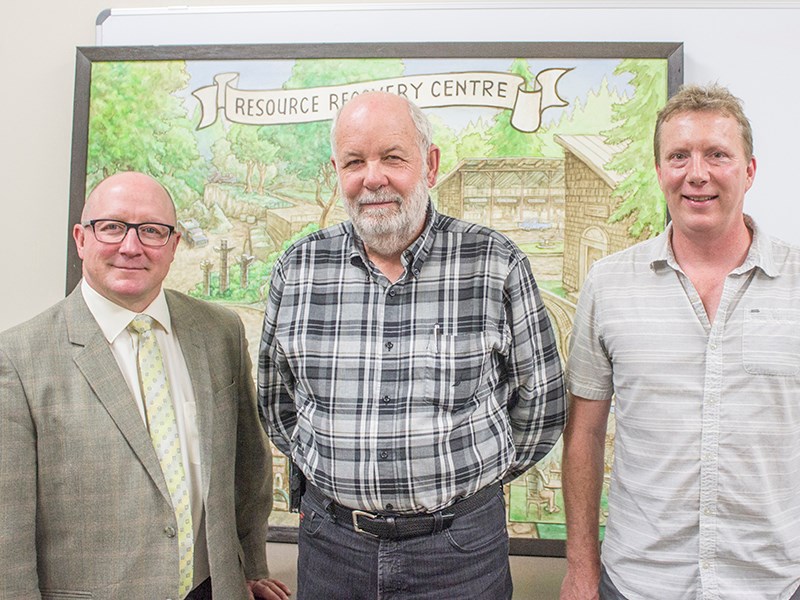For both the City of Powell River and Powell River Regional District, 2016 was a year for major infrastructure announcements.
For some time now, questions about replacing aging infrastructure have been pondered, from water supply and sewer systems in the city, to cleaning up former landfill and waste-incineration sites for the regional district. The past 12 months provided some answers.
In June, city council received a letter from BC environment minister Mary Polak informing the city that the province would be giving conditional approval for its consolidated wastewater treatment plans, the culmination of close to 20 years of work.
“I commend the city on its success in developing a comprehensive plan for the long-term management of liquid waste,” stated Polak.
The city announced its plans to purchase a 10-acre parcel from PRSC Land Development around the current quarter acre of land where an existing Townsite wastewater-treatment plant is located to build the new facility.
City director of infrastructure Tor Birtig said he was ecstatic.
“It was a long and complicated process,” he added.
With the provincial go-ahead, the city is looking for funding for the project, estimated to cost close to $30 million. At the time of approval, Birtig commented that the completed facility would not be finished before 2021.
Later in the fall, talks were underway between the city and Tla’amin Nation to see if the nation would partner on the project.
In July, regional board chair Patrick Brabazon announced that the regional district had received a $6-million grant from the federal government to pay for the cleanup of the former waste-incineration site near Willingdon Beach and to build a resource recovery centre, a facility that will provide waste education and expanded recycling.
“This is the largest grant received by this regional district,” said Brabazon. “I’m a firm believer in incremental progress. If I can’t save the world tomorrow, maybe I can save just a little bit of it right now. This is more than just a bit.”
To receive the funding, the board agreed to spend $2.8 million to fund the project.
Then, on September 30, during the last day of the Union of BC Municipalities annual conference in Victoria, community development minister Peter Fassbender announced a $3.5-million water infrastructure grant from the federal and provincial governments to go toward paying for the replacement of the trunk main that supplies the city’s drinking water from Haslam Lake. Total cost of the project had been estimated at just over $4 million, so the city will pick up the remaining amount from its reserve funds, approximately $700,000.
“It’s great news,” said city councillor Russell Brewer. “We’re on the hook for a lot less than we thought we might be, given we can cover it with our reserves, then we’re no longer looking at a tax increase to cover the difference.”
For the public, who have been waiting for Powell River Public Library to move into its new location at Crossroads Village Shopping Centre, 2016 provided escalating frustration. The city’s tenants already operating businesses there also had issues, dealing with disruptions caused by the renovations.
Unforeseen seismic upgrades and then disagreements over the scope of work necessary, and the city holding off issuing building permits until it was satisfied the project would meet provincial building and fire- code standards set the project back at least half a year. Initially expected to open during the late summer, progress on renovations did not become fully underway until November.
Medical marijuana was a focal point in Powell River throughout the year, in particular with unlicensed dispensaries. Though one dispensary, Grassroots Botanicals Wellness Cooperative, had already opened quietly and been in operation on Willingdon Avenue, WeeMedical Dispensary Society, a dispensary chain making waves throughout the province, opened its doors in a less than subtle way. Due to it operating as an unlicenced business, the opening attracted the attention of the city and Powell River RCMP because marijuana, despite political promises made during the 2015 federal election campaign to legalize cannabis, is still classified as a controlled substance.
Council backed down from threats of steep fines, deciding instead to follow the lead of other municipal governments dealing with the same issue. Developing regulations to limit where dispensaries could operate, who could enter the businesses and when they could be open, became the priority. As the city heads into the new year, those regulations have yet to materialize, though a consultant has been hired to look at current zoning and to develop them further.



